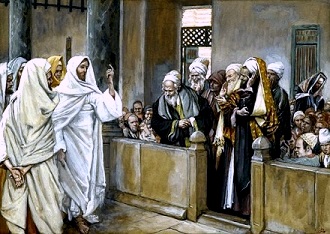
The pastor of a large parish in our city recently requested a transfer to a much smaller one for the sake of his own spiritual growth. Though a competent administrator, he felt he was so swallowed up with the details of parish life that his relationship with Jesus was suffering. He found that Church “business” had overtaken God’s “business”.
Is God’s primary “business” keeping the organization afloat or bringing people into the heart of the Kingdom of heaven—a deeper walk with Jesus? Remember when Pope Benedict XVI commented that all the Church “stuff”—its buildings, ceremonies, program, and bank accounts meant nothing if people were not encountering the real person of Jesus Christ.
Jesus had his most difficult moments when dealing with those who were in charge of “church business.” We listen to one such moment today (Matthew 23:23-26).
“Woe to you, scribes and Pharisees, you hypocrites. You pay tithes of mint and dill and cummin and have neglected the weightier things of the law.”
These religious leaders had become masters at playing the role of religious people by living strictly according to the lesser provisions of the law and giving the impression that they were close to God. Their piety was superficial, and though it impressed the people, it did not impress God. They neglected the “weightier,” more significant aspects of the law. And so Jesus called them “hypocrites” or actors, whose role-playing did not match their personal lives.
What were the weightier things of the law?
“…judgment and mercy and fidelity. But these you should have done, without neglecting the others.”
One can see herbs—mint, dill, and cummin–. On the other hand, such things as judgment, mercy, and fidelity are unseen. These are qualities of the heart and reflect the personality of God.
“Blind guides, who strain out the gnat and swallow the camel! Woe to you, scribes and Pharisees, you hypocrites. You cleanse the outside of cup and dish but inside they are full of plunder and self-indulgence.”
If a beautifully decorated and polished silver cup were filled with stagnant dish water, would you want to take a drink from it? On the other hand if a cheap, earthenware cup is filled with choice wine would you want to drink from it? It is the contents of the cup that is most important. Of course the best scenario is having a beautiful silver cup filled with the choicest wine. We want to use a sacred-looking cup because of the sacredness of the wine.
The contents of the “cup” that the scribes and Pharisees presented were worse than filthy dish water. What motivated them to play a religious role was not love of God but love of themselves. They plundered the poor so they could live a more luxurious life. In other passages Jesus named the contents of their heart as pride and greed. These people were using God to feather their own nests, rather than using themselves to reflect the true qualities of God’s heart.
“Blind Pharisee, cleanse first the inside of the cup, so that the outside also may be clean.”
Jesus told the blind Pharisee to take care of his spiritual blindness first, then his outside would take care of itself. He wouldn’t have to pretend to be holy because he would, in fact, be holy.
Like the pastor mentioned at the start of this reflection, we all must do some soul-searching. Have we fallen into the trap of equating Jesus with church activities? Do we go about doing our church duties because we want to make a good appearance or because we are in love with Jesus Christ. When the religious routines do not reflect the contents of our hearts, then we can imitate the pastor and do some “down-sizing” in our lives.
No matter what our cups look like on the outside, God looks at the inside. He is concerned about the contents of our heart, because this is what matters to Him.
And so we sing, “Change my heart O God; make it ever true. Change my heart O God; may I be like you.”
